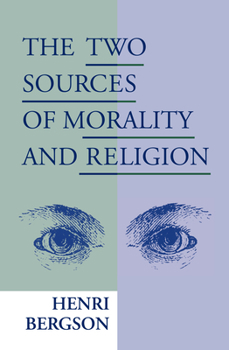Two Sources of Morality and Religion
Select Format
Select Condition 
Book Overview
Henri Bergson inquires into the nature of moral obligation, into the place of religion and the purpose it has served since primitive times, into static religion and its value in preserving man from the dangers of his own intelligence; into dynamic religion or mysticism as a means of producing man's forward leap beyond the limits of the closed society for which nature intended him and into the open society which is the brotherhood of man.
Format:Paperback
Language:English
ISBN:0268018359
ISBN13:9780268018351
Release Date:January 1977
Publisher:University of Notre Dame Press
Length:320 Pages
Weight:0.85 lbs.
Dimensions:0.7" x 5.4" x 8.1"
Customer Reviews
2 ratings
about as deep as it gets
Published by Thriftbooks.com User , 16 years ago
Here is a work of such scope that it seems very difficult to summarize. One of the main ideas is that the human intellect was evolved as a tool for survival through problem-solving. This tool worked so well that it threatened to become self-defeating, as individuals began to realize they could use their intelligence to take advantage of their fellow beings. This development posed a risk to society as a whole, whose preservation is nature's primary aim. Thus, regulating mechanisms; duty, obligation, morality and religion are supplied to limit intelligence to its role of serving society as a whole. This is of course a very incomplete thumbnail sketch of ideas which Bergson develops in great depth. He advances concepts to explain the mechanism of how this might have happened, and goes on to draw conclusions about what he thinks it might mean for the future of mankind. Though not overtly religious, his presentation shows a belief in the possibility of mystical revelation as a further advancement of the intellect. Bergson presents this not as an article of faith, but as a concept based on his ideas of the dynamic nature of the evolutionary process. Whether or not it is entirely accurate in its conclusions, I believe the book merits 5 stars as a brilliant treatment of the derivation of fundamental elements of human behavior.
A brilliant exposition by a great thinker.
Published by Thriftbooks.com User , 20 years ago
In Bergson's "Two Sources," the famous french thinker applies his relational methodology and metaphysic to an analysis of religion and morality. Bergson himself was certainly very careful about how he presented his own religious sentiments, and this book continues to show that care, coupled now with his meticulous attention to phenomenological detail. Hence, this is not a proselytizing sermon, but a close analysis of phenomenological *sources* of religious and moral sentiment.This is a later work of Bergson's, and as such, it might not be the best introduction to his work. One can see a great deal of Bergson's previous metaphysical thought operating in the background if one knows what to look for. To catch up on that background, one might want to read _Time and Freewill_ or _Matter and Memory_, for instance.However, its also not clear that one really needs that background to appreciate this book. For one thing, this volume gives one of the clearest examples of Bergson's methodology that I have encountered (in my admittedly limited studies). This method has come to be known as Bergson's "qualitative calculus" (QC). The QC has certain obvious similarities with Hegel's dialectic: a phenomenon gets analyzed as a product of two tensional poles which define a spectum of relations between them. But the differences are also manifest. The poles, for Bergson, have none of the ontological status of Hegel's objective idealism. Nor are they so much Ideal Opposites, as they are the two ends of a relational spectrum. Bergson's relational approach is not built around a sharp, black/white oppositional structure the way Hegel's is (or at least appears to be in some readings).The two poles for Bergson are, in this instance, what might be called "habit" and "inspiration," which lead to, respectively, static and dynamic structures. These structures are rarely if ever encountered in their pure forms, and as such the two poles are the abstracted ideal elements of a phenomenological analysis. Chapter one of _Two Sources_ focuses on morality, and gives the initial development of QC structures that Bergson will then apply throughout the rest of the book. Chapter two takes religion in its static, habit based form, and further delves into this structure along the lines of Bergson's QC. (Here, again, we see the debt to Hegel, where each stage of the dialectic leads to a deeper analysis.) Chapter three takes religion in its dynamic phase, and the final chapter summarizes and offers conclusions.Once again, this is not a book looking to convert the faithless, nor is it preaching to the choir. It is a careful analysis along the lines of James' _Varieties of Religious Experience_. (By the by, for those who don't already know, Bergson and James were frequent correspondents, and admirers of one anothers work.)It may not be the best introduction to Bergson's thought, but it is certainly worthy of reading.





